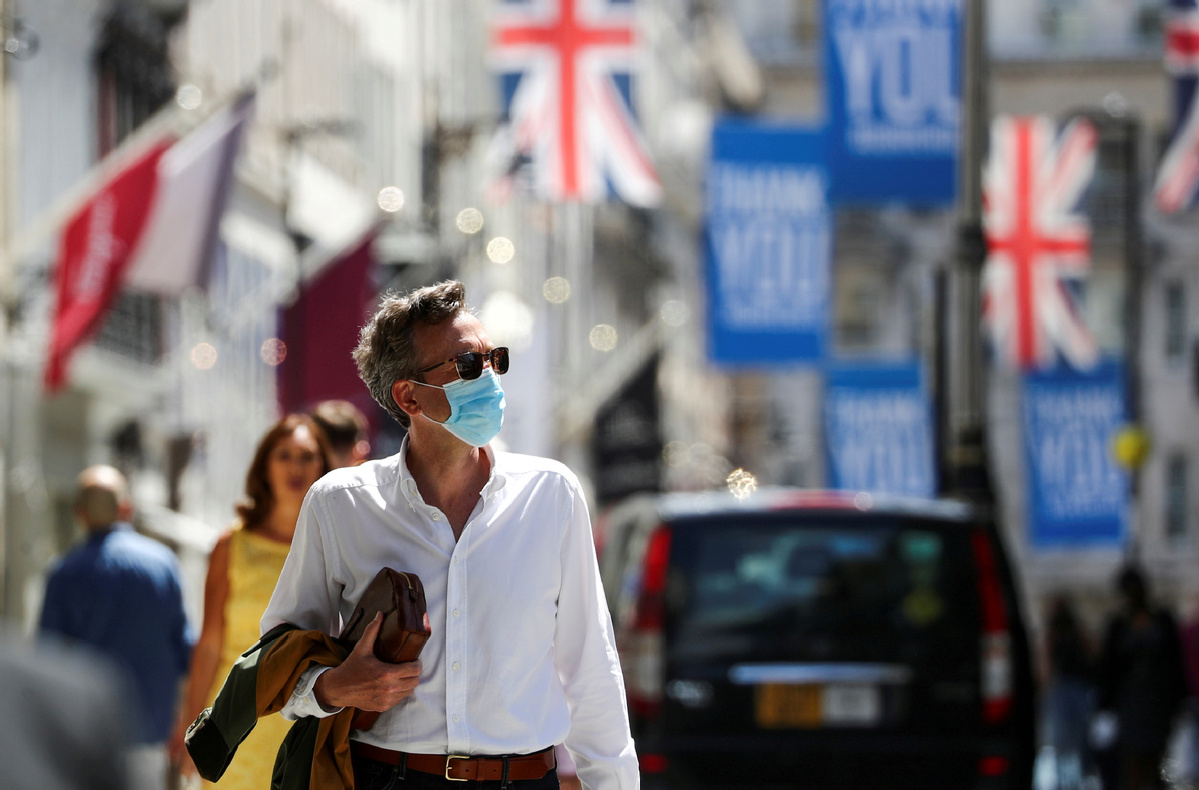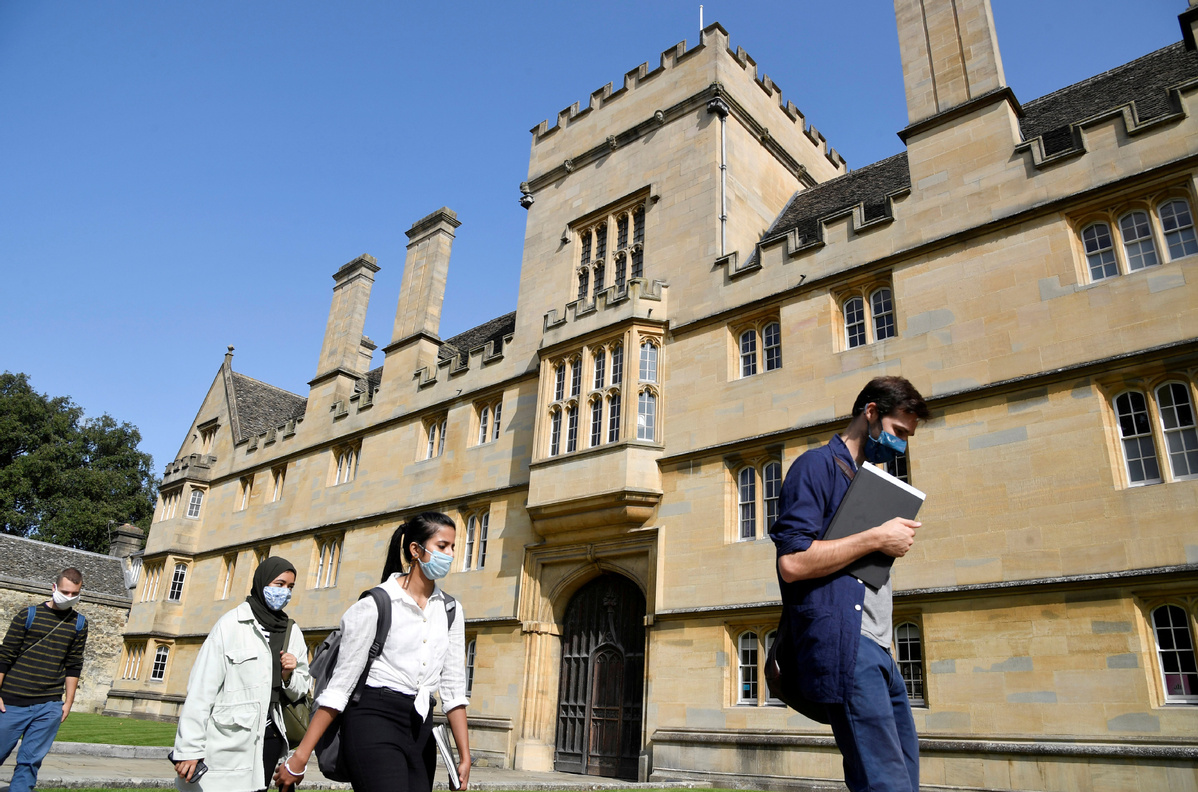国际货币基金组织(IMF)10月13日公布最新一期《世界经济展望》,预测今年世界经济将萎缩4.4%,比今年6月的预测数据上调了0.8个百分点,并预计2021年增长率将反弹至5.2%,比6月份的预测低0.2个百分点。中国将是世界主要经济体中唯一保持正增长的国家,预计今年增长为1.9%,明年将达到8.2%。

A shopper wears a face mask in Old Bond Street, amid the coronavirus disease (COVID-19) outbreak, in London, on July 18, 2020. [Photo/Agencies]
The International Monetary Fund on Tuesday turned slightly more positive on the global economy for this year, but warned of a “long, uneven and uncertain” recovery.
国际货币基金组织10月13日发布报告,对今年全球经济的预期略有上调,但警告称,全球经济复苏将是“漫长、坎坷而不确定的”。
The global economy is now projected to contract by 4.4% in 2020 — an upward revision from an estimate of -4.9% made in June (which has now also been revised to -5.2% due to a new methodology used by the IMF). The IMF’s forecast assumes that social distancing due to the coronavirus pandemic will continue into 2021, and that local transmission will fall everywhere by the end of 2022.
根据国际货币基金组织的预测,全球经济在2020年将萎缩4.4%,高于6月份下降4.9%的预测(由于国际货币基金组织采用新方法,该数据被修正为下降5.2%)。国际货币基金组织的预测认为,新冠疫情造成的社交隔离措施将持续到2021年,到2022年年底,全球各地的社区传播都将减少。
Among major economies, only China is expected to expand in 2020. The IMF believes the country, which battled Covid-19 earlier than the rest of the world and was quickly able to move out of lockdown due to strict containment measures, will grow by 1.9%.
在主要经济体中,只有中国有望在2020年实现经济增长。国际货币基金组织预计今年中国经济增长将达到1.9%。中国比世界其他国家更早抗击新冠肺炎疫情,由于采取了严格的管控措施,迅速走出了封锁状态。
“We are projecting a somewhat less severe though still deep recession in 2020, relative to our June forecast,” the IMF’s chief economist, Gita Gopinath, said in the latest World Economic Outlook.
国际货币基金组织首席经济学家吉塔·戈皮纳斯在最新的《世界经济展望》中表示:“与我们6月份的预测相比,我们预计2020年的经济衰退仍很严重,但比此前的预计略轻微。”
She added that the revision was driven by better-than-expected growth in advanced economies and China during the second quarter of the year and signs of a more rapid recovery in the third quarter.
她补充称,此次上调今年世界经济增长率的主要原因是第二季度发达经济体和中国的经济数据好于预期,且有迹象显示第三季度的复苏更为强劲。
However, the outlook warned that the coronavirus crisis is far from over.
不过,报告警告称,新冠危机远未结束。

People wearing protective face masks walk past Wadham College, Oxford University, ahead of the new academic year, amidst the coronavirus disease (COVID-19) pandemic, in Oxford, Britain, on Sept 17, 2020. [Photo/Agencies]
The IMF projected “only limited progress” going forward and cut its gross domestic product growth expectations for next year to 5.2%, from an estimate of 5.4% made in June.
国际货币基金组织预计,未来解决新冠危机的“进展有限”,并将明年国内生产总值增长预期从6月份估计的5.4%下调至5.2%。
“While the global economy is coming back, the ascent will likely be long, uneven, and uncertain,” Gopinath said, while adding that “prospects have worsened significantly in some emerging market and developing economies.”
戈皮纳斯说:“尽管全球经济正在复苏,但这可能是漫长的、不均衡的和不确定的。”她补充称,“一些新兴市场和发展中经济体的前景已明显恶化”。
Emerging market and developing economies are seen contracting by 3.3% this year, but in places like India, GDP is seen falling by more than 10%.
新兴市场和发展中经济体的经济今年预计将下降3.3%,但印度等地的国内生产总值降幅将超过10%。
Meanwhile, the United States economy is set to fall by 4.3% this year, but the economic contractions in the UK, France, Italy and Spain are around 10%.
与此同时,美国经济今年将下降4.3%,而英国、法国、意大利和西班牙的经济将下降大约10%。
Looking ahead, the IMF offered a bleak look at how the global economy might perform over the medium term, its first such forecast since the outbreak began.
展望未来,国际货币基金组织对全球经济的中期表现做出了悲观的预测,这是自疫情暴发以来该组织首次做出此类预测。
Global growth is expected to slow to roughly 3.5% between 2022 and 2025, leaving the output of most economies below levels that were predicted before the pandemic.
预计2022年至2025年,全球经济增速将放缓至3.5%左右,使大多数经济体的产出低于疫情暴发前的预期。
The IMF emphasized that uncertainty surrounding its projections is "unusually large" given the lack of clarity on the health crisis and the economic response, especially as global debt levels increase.
国际货币基金组织强调指出,鉴于卫生危机和经济应对措施不够清晰,特别是在全球债务水平上升的情况下,其预测的不确定性“非常大”。
The recovery “is not assured while the pandemic continues to spread,” the IMF said in its latest economic analysis.
国际货币基金组织在其最新的经济分析中表示,“在疫情继续蔓延的情况下,复苏并不确定”。
The IMF has advised governments to keep some degree of accommodative policies to prevent a wider gap in income distribution, despite growing levels of public debt.
国际货币基金组织建议,尽管公共债务水平不断上升,各国政府应保持一定程度的宽松政策,以防止收入分配差距扩大。
accommodative [ə'kɒmədeɪtɪv]:adj.适应的;调节的;予以方便的;随和的
In addition, the IMF mentioned that geopolitical tensions, trade friction, natural disasters, changes to financing conditions and further outbreaks remain downside risks to its projections.
此外,国际货币基金组织预计,经济下行的风险还有地缘政治紧张局势、贸易摩擦、自然灾害、融资条件变化和疫情进一步暴发。
英文来源:CNBC、CNN







